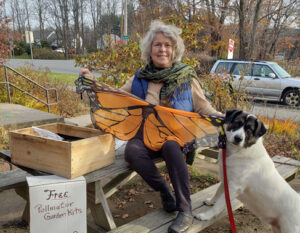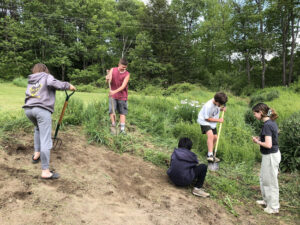By 2017, 347 native bee species from the USA and Hawaii were at extinction risk, Pollinators in Peril, a report by the Center for Biological Diversity.
“If our kids can learn about taking care of the environment now, then there is some hope”, Jane Collister, Founder of the Wildflower Pollinator Project.
 When you have a passion, it fills your heart and makes you look forward to each day just so you can wake up and put all of your mental and physical energy into it. Being able to share a passion with others and see how this love of yours changes the world for the better is pure bliss. For Jane Collister, her passion is wildflowers and the vital role they play in preserving the lives of the pollinators.
When you have a passion, it fills your heart and makes you look forward to each day just so you can wake up and put all of your mental and physical energy into it. Being able to share a passion with others and see how this love of yours changes the world for the better is pure bliss. For Jane Collister, her passion is wildflowers and the vital role they play in preserving the lives of the pollinators.
“I started about 12 years ago to plant the gardens at my home. I really got involved in making these gardens larger and larger because I found joy in doing it and in observing the wonderful pollinators that came such as native bees, like the bumble bee, swallowtails, butterflies, hawk moths and many others,” recalls Jane. “But a few years ago I started noticing fewer pollinators were coming to the gardens, a lot fewer bees, fewer butterflies.”
The Pollinator´s Crisis
The United States Department of Agriculture recognizes the importance of pollinators in the food production system. According to the department, more than 100 crops rely on pollinators in the USA and there are around 2.8 million honey bee hives in the country.
There are 4,337 different species of native bees in North America and Hawaii alone. However in 2017, based on sufficient data from 1,437 native species, it was found that 347 were considerably decreasing and at extinction risk; that is nearly 1 out of 4, according to Pollinators in Peril, a report by the Center for Biological Diversity.
In fact, according to the United States Honey Bee Colony Losses 2022-2023: Preliminary Results from the Bee Informed Partnership, from April 1, 2022 to April 1, 2023 beekeepers in the USA lost an estimated 48.2% of their bee colonies. An increase of 9.2% from the previous year.
According to Pollinator Partnership, the main reasons for pollinator’s decline are: pollution, chemicals, diseases, climate change and the loss of feeding and nesting habitats.
When the Buzz Went Silent
Jane Collister has had a deep connection with the natural world since her childhood. She went to college in Cambridge, Massachusetts. and decided to stay in the area to study natural healing. She attended classes in Cambridge, New York, and California given by the American Polarity Therapy Association and became a Registered Polarity Therapy Practitioner. Afterwards, she opened an office in Putney, Vermont where she practiced for many years and now offers sessions from home.
Jane made her home in Westminster West, a nature’s paradise, enjoying the colors and beauty of native wildflowers. During the Spring and Summer, she rejoiced with the continuous buzz of pollinators around her flowers, but when she saw the noticeable decrease of winged visitors to her garden she decided to investigate and help.
“I decided to do some research on the internet and I found out that there is a very serious crisis in the populations of pollinators, not only in this country but worldwide,” explains Jane. “But I also found, while researching, that horticulturists had developed a way to greatly increase the number of seedlings that can be cultivated for wildflowers in order to replace the habitats that we have taken away from the pollinators, taken away meadows and put in grass lawns.”
Wildflowers to the Pollinator’s Rescue
After Jane’s discovery of the critical condition of pollinators, she decided to take matters into her own hands. In Spring 2022, she created the Wildflower Pollinator Project, and a comprehensive website to educate people about the crisis pollinators face www.putney.net/pollinators. Jane gave talks at the Putney Public Library and at events she held at the Putney Co-op.
“Something in me just felt that something had to be done,” says Jane. “I just went ahead and with my own resources and made the Wildflower Nursery Kits, offering them for They are the gardening method that horticulturists developed and it just seemed like a wonderful idea. It’s very simple, you don’t even have to be a gardener to do this process, and it protects the wildflower seeds. You basically press seeds into a dozen poots and take them outside. You water them and then you cover them with a frame that has mesh. So the two things they are protected from is from being eaten by birds or rodents, and as the Kits aren’t put outside until the winter temperatures stabilize, they are protected from the effects of global warming. And because the pots can be densely seeded, they provide an abundance of wildflower seedlings in the Spring. I made a lot of these kits and I offered them to people at the entrance to the Putney Co-op. It was a wonderful experience because people came by and started talking to me and I could explain to them what was going on with the pollinators. All the kits I made were taken.”
Expanding the Wildflowers
 By Spring of 2023, Jane supplied over 40 Wildflower Nursery Kits that have the potential to grow four separate wildflower plants each, as the 15 pots x 4 equals 60 seedling bundles, that can strengthen the life support for feeding pollinators. Some of the wildflowers that Jane grows are: MilkWeed, Bee Balm, Echinacea, Lavender Hyssop, Black-eyed Susan and others. Despite the fact that the most challenging thing about the project has been finding volunteers, Jane’s work continues to have a powerful impact on the community, including at Putney’s Town Hall.
By Spring of 2023, Jane supplied over 40 Wildflower Nursery Kits that have the potential to grow four separate wildflower plants each, as the 15 pots x 4 equals 60 seedling bundles, that can strengthen the life support for feeding pollinators. Some of the wildflowers that Jane grows are: MilkWeed, Bee Balm, Echinacea, Lavender Hyssop, Black-eyed Susan and others. Despite the fact that the most challenging thing about the project has been finding volunteers, Jane’s work continues to have a powerful impact on the community, including at Putney’s Town Hall.
“I am going to put a wildflower garden in the Putney Town Hall,” shares Jane joyfully. “The manager of the Town Hall is wonderful, she understands the pollinators crisis. We want to replace the flowers on the side of the building because they do not help pollinators, such as Daylilies, Irises, and Peonies, and put in wildflowers. We need to do this as quickly as we can because it is a crisis. Word is growing and people are beginning to realize, to become conscious and aware that this is happening, that the pollinators are really dropping.”
The Pollination Project
Jane aims to continue expanding her work. This Fall she is scheduled to give talks to educators and she wants to increase the number of Wildflower Nursery Kits she can supply. That is why she looked to The Pollination Project for help to buy the tools and supplies needed to achieve this.
“I searched around the internet for opportunities and places where I thought I could get funding. So I went to your website and was delighted to find out about you and your program, it’s just wonderful,” says Jane. “When I knew I was going to get the grant it was unbelievable, wonderful.”
What worries Jane the most is the environment and how not everyone is aware of the importance of taking care of our planet.
“People haven’t been conscious about the importance of the environment and what we have been given, which is just an amazing system that supplies everything that we need and that is very sad for me; this attitude of taking what you can take when you can take it and not caring about the future,” says Jane. “But I am hopeful that our kids can be introduced to the idea of taking care of the environment. If they can learn about this now, then there is some hope to restore nature and save the pollinators.”
Join Us
If you are inspired by this work and have an idea for a project that addresses an issue that you are passionate about, we’d like to invite you to submit an application and together we will build a better, more compassionate future!
If you would like to support the work of more changemakers like this around the world, please visit our donation page and make a gift today!
